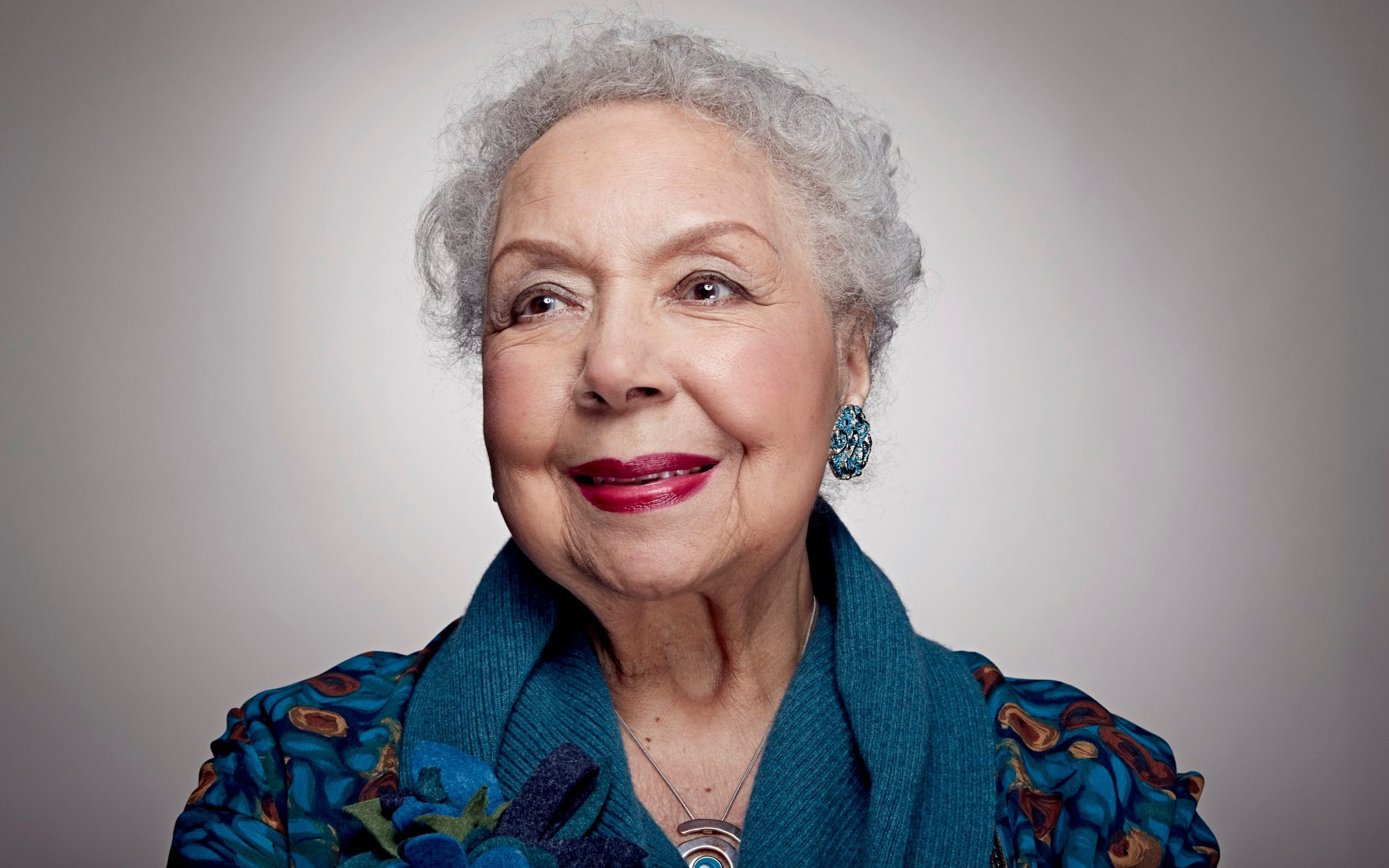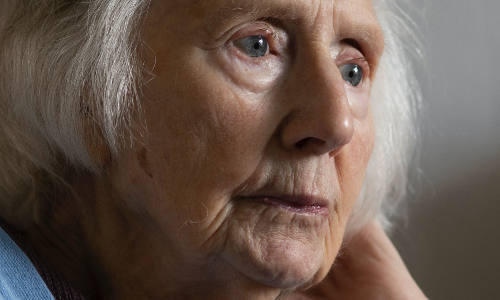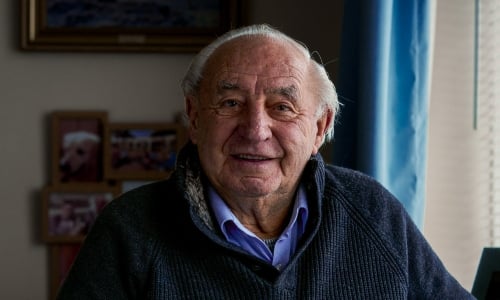VE Day marks the day when Nazi Germany surrendered to the Western Allies, bringing an end to the Second World War in Europe. This year is its 80th anniversary, so we spoke to our storytellers Lauretta and Sylvia about their wartime memories and how they celebrated VE Day 80 years ago.
Lauretta
Lauretta is 102 and lives in London. During the war, she worked as an entertainer, singing and performing for people up and down the country.
“Everyone was called upon to do their bit. Because I was an entertainer, I joined ENSA, the Entertainment National Service Association, which I remained part of until the end of the war. Because we were performing to service personnel the length and breadth of Britain, we went wherever we were sent. So one time it might be Cornwall, then the next week maybe Lands End, Kingsland, Scotland or Tenby, Aldershot or Liverpool, wherever we had to go.

“If we were sent to Liverpool or Kirby, for example, we would likely be performing in factories to entertain the munitions workers. They’d have a stage, and we’d entertain while they worked. While if it was Portsmouth or Plymouth we were sent to, it would be to entertain naval personnel, perhaps on a battleship.
“We’d go to a town, and you’d have a dispatch rider who would go with you, because you might be travelling to a military place, so somewhere secret. I felt I was able to make a difference by doing something that I loved. Everybody at that time was under so much stress, not knowing from one minute to the other what was going to happen. Even at home, when a plane flew over, you never knew if it was going to be dropping a bomb and that could be it for you or your friends. It was therefore nice, during those difficult times, to be able to provide some light relief, even if only for an hour or two. Everybody could join in and have a sing-song, and for that short amount of time, they could forget what was going on.
When the war broke out, I was 17. By the time the war finished, I was a married woman with two children.
“I always liked performing sentimental songs, such as the song Room Five Hundred And Four. And of course there were the songs that Vera Lynn sang, like White Cliffs Of Dover. Then there were things the public knew, like Hands, Knees And Boomps-A-Daisy and The Lambeth Walk, that were rousing and got people joining in.
“Did I have a favourite place to play? Well, the best venue didn’t necessarily mean the best crowd. Sometimes the more out of the way and isolated the place was, the more you’d be appreciated. I remember once having to hike my evening dress up and get on the back of a motorbike and go over fields to perform in a hut, on a stage made of planks and orange boxes.
“It was very hard to be away all the time. When the war broke out, I was 17. By the time the war finished, I was a married woman with two children. And obviously I couldn’t travel with babies. I came out of hospital with my second daughter on Friday, and was back at Drury Lane rehearsing on Monday. My aunty looked after the baby right away, and it was hard to get back, so it might be weeks or even months before I could get home, so that was stressful. It was very difficult with little children, because they didn’t understand why I had to be away. So my aunty and uncle were closer to my children during those formative years than I was.
I hadn’t thought of the future before, but suddenly I was thinking, ‘What happens now?’
“You had the feeling the war was going to end, but when VE Day came, you couldn’t believe it was really happening. That way of life that I’d been used to for some many years, being hectic every day, was gone and I was back in London, with all the time in the world to stop and think, which I didn’t have before. I hadn’t thought of the future before, but suddenly I was thinking, ‘What happens now?’ After a time, I went to Ireland, singing in a ballroom with a dance band, doing cabaret and theatre work, and came back to England about three years later.
“I remember on VE Day being in Cambridge Circus [in London], by the Palace Theatre. I was standing and watching the parades go by. Seeing the lights suddenly being put on in the evening, after years of blackouts, was really something to remember. And there were street parties, where people brought out their tables and neighbours contributed the food they had, so no one went without.
“I know what a toll war takes on people’s lives, and I’m more frightened about the prospect of war now that I’m much older. My grandmother had been through the First World War, and she must have felt the same when the Second World War arrived. The world is so fragmented now – and war is so different. It makes you feel a bit insecure.”
“We knew that what we were doing was important, but we didn’t know how.”
Read 102-year-old Terry’s account, in her own words, of her experiences during World War 2. Although Terry didn’t know it at the time, her work would prove to be central to a turning point in the war.
Read more about Terry's experiences
Sylvia
Sylvia, 95, has lived in the West Midlands all her life. She was 9 when the Second World War broke out. Her five brothers all fought in the conflict.
“One evening in 1939, my oldest brother, who fiddled around with radios, got us all out of bed and into the lounge. He said: ‘Now, all be quiet’, and we listened to the fall of Poland. We heard gunfire, cries for help, and then the radio went dead.
“My brother was 17-and-a-half at the outbreak of war and he volunteered for the forces. The next brother was in the Glasgow Islanders. He was trained up in Scotland and he was in the 52nd division. He came home badly wounded. The next brother followed him – and the next one. My youngest brother signed up for the forces towards the end of the war.
“We lived near an aerodrome, and that's what the German planes were after. When the bombing started in 1940, it was really bad. The planes used to go over our house. We had an air raid shelter that we had to go into every night. We still had to go to school. If we were going to school and we heard the air raid sirens, we couldn't go home, but had to go to school to be counted. The cinemas stayed open. And on Saturday morning you could go to the cinema, which the children did. But if there was an air raid siren, you had to go down to the shelters.
On VE Day, we all met outside the church and danced around the flagpole
“All food was rationed. I think it was two ounces of sugar and two ounces of butter for each person. My mother coped well. You had coupons for clothes, coupons for shoes, and the point was, if you got a hole in your shoe, then you had to have to put cardboard in it. It didn't matter whether you had money or not – if you didn’t have coupons, you couldn't get shoes.
“We were better off than people living in the city centre, because they bombed Birmingham very badly. We had a beautiful park but soon German and Italian prisoners of war were housed in the park, so we were no longer allowed to go in.
“On VE Day, we all met outside the church and danced around the flagpole, then we had to go up to the town hall and stand outside while it was announced that it was VE Day. Months later, on 14 August, it was VJ Day, which signified victory in Japan. That's when the forces all started, very slowly, coming home.
“We’re a big family, but every Christmas all through the war there was just my mum, my dad, my sister and me. It was horrendous, but at the time we didn't think because we were too young to think. It was just the aeroplanes, every night. Even today, on Bonfire Night, I cannot stand the noise of fireworks. There must be a lot of people like me.”






